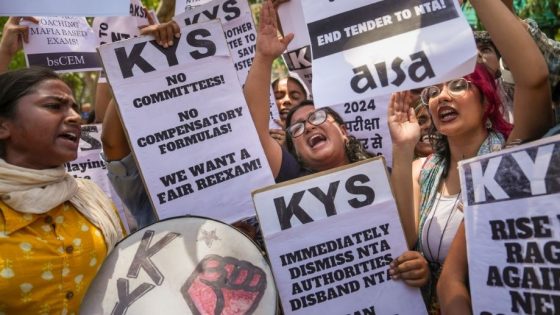Days after the Education Ministry constituted a four-member panel to probe the allegations of inflation of marks in the recently-concluded NEET-UG medical entrance exam, India Today TV has accessed the names of the high-powered committee figures.
The ministry ordered setting up a four-member panel headed by a former Union Public Service Commission (UPSC) chairperson to review the grace marks awarded to more than 1,500 candidates.
One of the members of the high-powered committee is Professor Pradeep Kumar Gupta, chairman of the National Testing Agency (NTA). In the note accessed by India Today TV, Professor Gupta is also a former UPSC Chairman.
However, the Opposition has raised concerns about how a person who is at the top position of the NTA can also be part of the same committee constituted to look at anomalies in the NTA exam conducting process.
Other members of the panel are TC Anant, the former chief statistician of India, Ministry of Statistics and Programme Implementation, and former member of UPSC, CB Sharma, former chairman of the National Institute of Open Schooling (NIOS), and and Dr. (Prof.) B. Srinivas, a member from the National Medical Commission and DDG (DGHS).
In its reply to the Supreme Court, the committee stated, “This Committee further finds that the grievance redressal cell (GRC) submitted its report recommending the award of compensatory marks to all the candidates based on the formula applied by the Hon’ble Supreme Court in the case of Disha Panchal, concerning 4,690 candidates of CLAT 2018”.
“Recommendations of GRC (grievance redressal cell) were implemented by awarding compensatory marks to 1563 candidates. This Committee has undertaken an in-depth examination and consideration of the revisionary process of the results concerning 1563 candidates and on careful consideration thereof has observed as under – This Committee observed that, unlike CBTs, OMR-based examinations do not have an automated system for time assessment (timestamp of the candidate’s activities during the examination),” the committee told the top court.
Furthermore, it said that the GRC had determined the loss of time for the affected candidates based on the reports of the examination functionaries and CCTV footage of the exam centres.
“The GRC recommended the award of marks without examining the impact of such an exercise by taking into account the core consequential aspects, including the number of questions unattempted by the individual candidates,” it said.
The panel also said that it is of the view that the “loss of time ascertained by the GRC and the use of the methodology to obtain compensatory marks resulted in a skewed situation and produced a strange outcome of the result”.
“The skewed situation seems to have occurred as the GRC did not take into account that compensation for the loss of time had to be limited to the number of unattempted questions only. In fact, the outcome of the aforesaid process created a fallout, whereby it caused serious heartburn and resentment amongst the student community. The process resulted in the creation of a distinct class of candidates who gained an advantage, and it appears to be disproportionate as well as unfair for the rest of the candidates,” it said.
“After examining all the aspects of the situation in totality, this committee concludes that the most appropriate, fair, and reasonable solution to the issue would be subjecting those 1563 candidates to a retest at the earliest possible,” it concluded.
(With inputs from Kanu Sarda.)
Source Agencies




